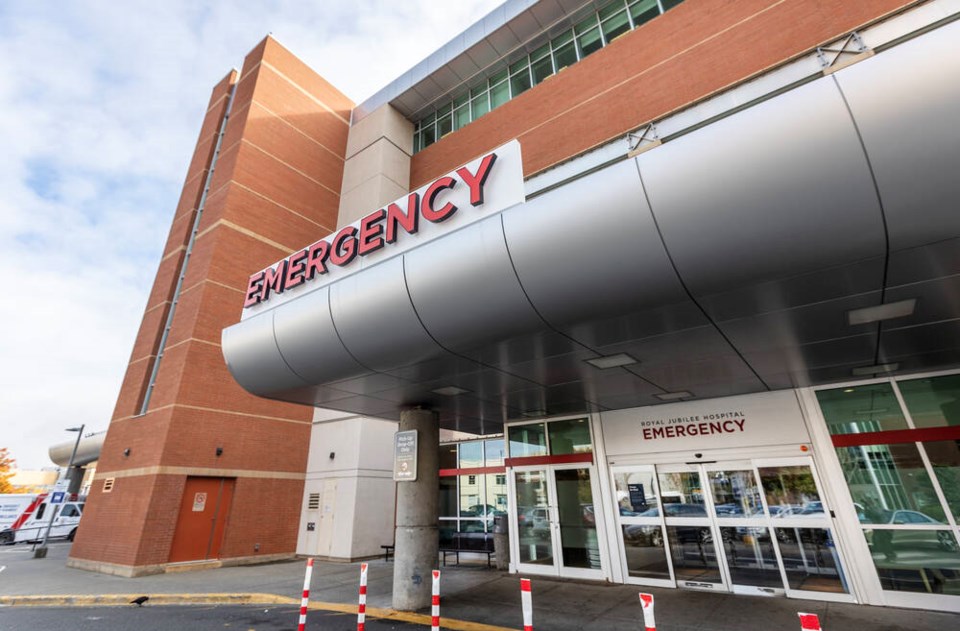Victoria Police Chief Del Manak says police are waiting up to eight hours at Royal Jubilee Hospital to hand over psychiatric patients, a problem that could be solved in part by provincial legislation to give security guards in hospitals special constable status.
Manak said hospital security used to have special constable status but it was revoked more than 20 years ago, and needs to be reinstated.
The chief said police who have apprehended people under the Mental Health Act and need to leave them in the care of clinicians waited an average of two and a half hours in July and August, up from an average of 1 hour and 47 minutes last year.
On Aug. 30, Manak posted on social media that an officer had waited seven hours — from 2 a.m. to 9 a.m. — for his patient to see a physician.
“As a chief, it’s frustrating for me when my officers aren’t able to be on the road responding to calls for assistance, and we’re waiting up to seven hours to receive care,” said Manak, adding he was told the wait times are the result of a shortage of human resources.
“None of my comments are a reflection or criticism on our health-care professionals — our nurses, our doctors, our healthcare professionals,” he said. “They are stretched to the limit.”
He added that the current system is also not good for patients forced to wait hours in distress and discomfort.
Manak said the province is reviewing the efficacy of giving hospital security special constable status so they could take over from police and supervise patients until they are admitted. Currently, police are the only ones allowed to make apprehensions — not arrests — under the act and must accompany that person to the hospital.
Marko Peljhan, Island Health’s vice-president of clinical services for central and south Vancouver Island, said the health authority has struck a committee that includes emergency physicians, psychiatrists and police, which is meeting regularly to find efficiencies in the “handover processes,” with patient and staff safety as the priority.
Peljhan said he imagines it will be a matter of weeks before Island Health starts implementing some streamlining processes to make handovers as efficient as possible while maintaining safety and privacy.
He said Island Health is also monitoring its ER wait-time trends and that while hospital ERs across the province are seeing increased demand for services, eight-hour waits are “exceptional cases.” Patients are seen based on their level of urgency.
Peljhan wouldn’t comment on the possibility of provincial legislation allowing hospital security guards to be trained and granted special constable status, other than to say they are “highly trained individuals” who provide services under incredibly challenging circumstances and would be up to the job.
“I believe the individuals we have within our protections services team have that ability to do whatever is asked of them,” said Peljhan.
A coroners inquest is now looking into the death of Paul Spencer, a psychiatric patient at Royal Jubilee Hospital who died after an altercation with security guards, who put him cocooned in a blanket face down in a secure room.
Health Minister Adrian Dix, asked about the possibility of special constable status during an unrelated news conference in Prince George on Friday, said the ministry has been working with Victoria police on the issue.
Adults apprehended under Section 28 of the Mental Health Act who are considered a harm to themselves or others are brought to Royal Jubilee Hospital, while minors are taken to Victoria General Hospital.
In January 2023, Manak announced the department’s Co-Response Team, where a health professional such as a psychiatric nurse is paired with a plainclothes officer in an unmarked car. From 8 a.m. to 8 p.m. seven days a week they go into the community and assess and triage people so that they don’t end up in an emergency situation needing hospital care.
The psychiatric nurse, unlike police, can access a person’s medical records and gain greater insights into the next steps that should be taken. “I’m actually reducing the number of times that our officers are going to the hospital, so I’m actually not taxing the system like we were in the past,” said Manak, adding he doesn’t have enough resources to staff the team 24/7 as he’d like.
In 2022, Premier David Eby announced $3 million for more police-clinician partnerships around the province.
Island Health also oversees four multi-disciplinary Assertive Community Treatment teams — psychiatric nurses, addiction-recovery workers, registered nurses, social workers, and so on — who work with more than 300 people whose severe mental illness is often compounded by substance abuse.
Manak said the psychiatric calls attended by police come from all areas of the community and are not concentrated in the street population, which has a lot of mental health and addiction challenges.
He said police regularly get calls from family and friends who live outside Victoria asking police to check on their loved ones who are having trouble financially or emotionally or with a lack of housing.
“We’re seeing it with our street population but we’re seeing it out in community everywhere.”
Manak said he wants Island Health to see the wait times his officers are experiencing and to encourage the province to “make some of these changes that will take pressure off your hospital and emergency-room physicians and off police, who have a very important job in society as well.”
>>> To comment on this article, write a letter to the editor: [email protected]



